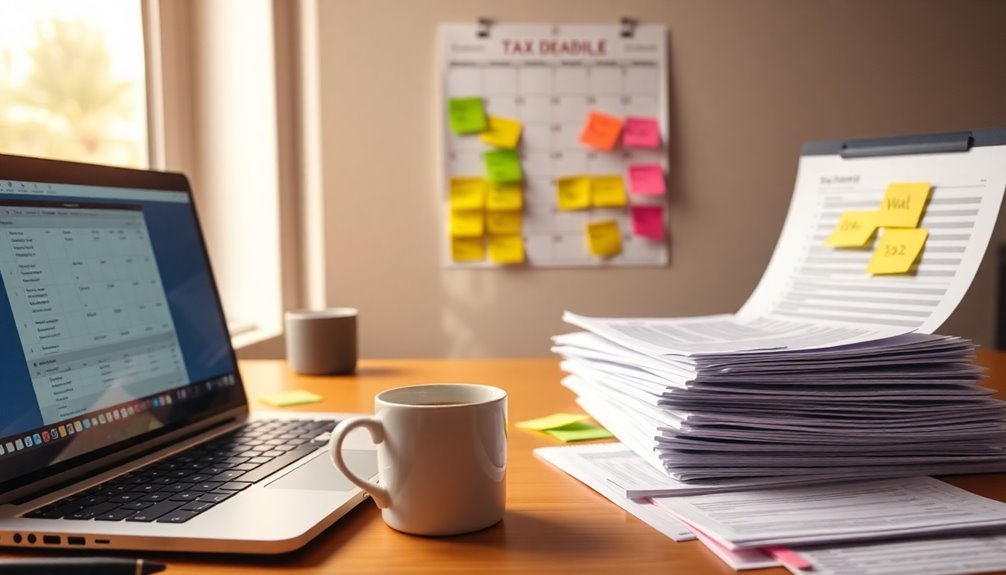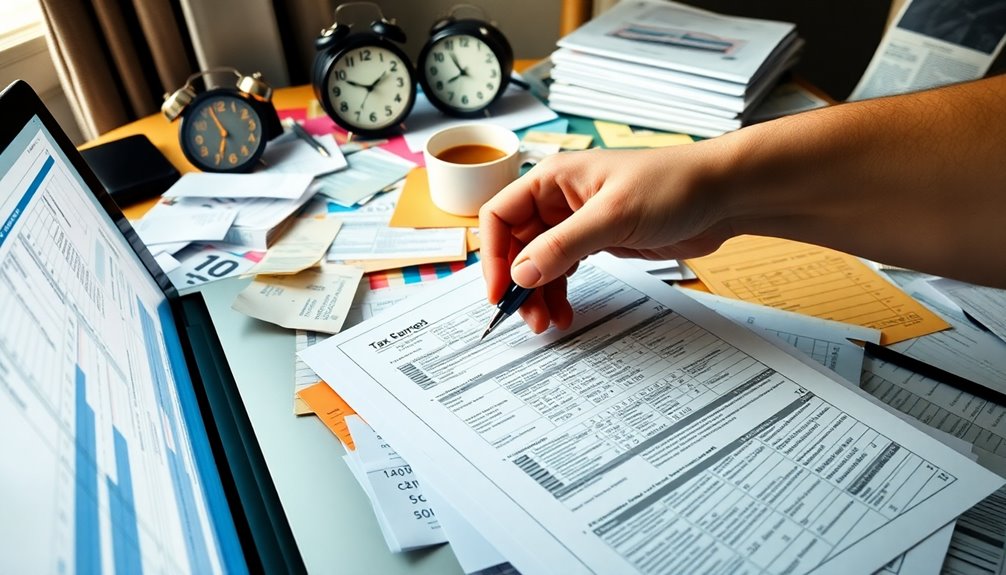To find out if you owe taxes, start by checking for IRS notices. A CP14 letter will indicate any unpaid taxes, while CP501 and CP503 serve as reminders. It's also wise to review your past tax returns for missed deductions or unclaimed credits. Setting up an IRS online account lets you view your tax balance and payment history easily. If you're still unsure, call the IRS directly for clarification. Finally, filing any overdue tax returns promptly can help minimize penalties. There's more to discover about managing your tax responsibilities effectively.
Key Takeaways
- Check your IRS online account to view your tax balance and any outstanding notices.
- Review recent IRS notices, such as CP14 or CP501, indicating unpaid taxes or reminders.
- Access past tax returns to identify any unclaimed credits or inaccuracies that may affect your tax liability.
- Contact the IRS directly at 1-800-829-1040 for specific inquiries regarding your tax status.
- Consult a tax professional to evaluate your financial situation and uncover any potential tax obligations.
Checking IRS Notices

When you receive an IRS notice, it's crucial to take it seriously and understand its implications. IRS notices come in various forms, each addressing specific tax issues.
For instance, a balance due notice, often a CP14 letter, outlines your unpaid tax bill, including penalties and interest. It also sets a due date for your first payment. If you ignore it, reminder notices like CP501 and CP503 will follow, potentially escalating to a final notice (CP504) which threatens a levy on your bank accounts.
Another type of notice warns of a potential tax lien on your property if you don't act. This gives you a chance to resolve the issue through payment plans or settlements. Immediate action is required to prevent lien filing, emphasizing the importance of addressing these notices promptly.
Additionally, some notices inform you that your tax refund will be used to settle your tax debt, detailing the amount affected.
Lastly, a seizure warning can notify you of possible asset seizure within a limited timeframe. Each notice contains essential information like amounts owed, due dates, and contact details for the IRS.
Always read these notices carefully and respond promptly to avoid further collection actions.
Reviewing Past Tax Returns

Reviewing your past tax returns is essential for ensuring you haven't missed any potential credits or deductions that could lower your tax liability. Start by checking for missed education credits or Earned Income Tax credits, which can significantly impact what you owe.
Look for unclaimed deductions that reduce your taxable income, and don't forget about overlooked carryover information like capital losses.
Next, identify any inaccuracies in your filings. Errors in reporting income or using incorrect tax forms can lead to issues. Make sure all necessary schedules and forms are included, and verify that your entries are accurate.
To access copies of your past tax returns, consider using tax preparation services like H&R Block or requesting transcripts from the IRS using Form 4506. If you're an H&R Block user, check the 'Taxes' tab and 'Prior Years' in your MyBlock account.
Lastly, consulting a tax professional can provide valuable insights. A CPA can help you uncover errors, guide you through filing amended returns, and assist in correcting any issues related to your filing status or deductions. This thorough review can save you from potential penalties down the line, as unpaid taxes can lead to significant penalties and interest.
Accessing IRS Online Account

Accessing your IRS online account is a straightforward way to keep track of your tax information and stay organized. To get started, you'll need to set up an online account on the IRS website. Once you've done that, you can log in to the View Your Account Information page, where you'll find essential details about your federal tax account.
This account provides access to your tax balance, payments, and various transcripts, including account, return, and wage and income transcripts. These transcripts contain crucial information about your filings, credits, and any penalties or assessments. Given that approximately 9 million taxpayers file returns but cannot pay taxes annually, it's important to stay informed about your tax situation.
To ensure your account's security, you'll go through the IRS's identity verification process. For added protection against identity theft, check out the IRS's Taxpayer Guide to Identity Theft.
Utilizing your account and its transcripts can help you resolve tax notices or discrepancies, prepare accurate tax returns, and verify income for lenders or other parties.
Contacting the IRS

If you need to resolve a tax issue or have questions about your tax return, contacting the IRS is essential.
You can call 1-800-829-1040 for individual tax return inquiries or 1-800-829-4933 for business-related questions, both available from 7 AM to 7 PM local time, Monday through Friday.
If you want to check your refund status or speak with a representative, dial 1-800-829-1954. Keep in mind that long wait times are common, especially during peak periods.
Alternatively, consider visiting a local IRS office. You can find your nearest office using the IRS contact page or Taxpayer Assistance Center locator. Taxpayers are encouraged to seek assistance if overwhelmed by debt.
To reduce wait times, schedule an appointment in advance. In-person assistance is useful for more complex or urgent issues.
Filing Past-Due Tax Returns

Filing past-due tax returns can feel daunting, but taking it step-by-step makes the process manageable. Start by gathering all necessary information. Obtain wage and income transcripts from the IRS, which detail data from your W-2 and 1099 forms.
You'll also want to check for any estimated tax payments or credits posted to your account for that tax year. Don't forget to collect info about self-employment, investments, and other income not on file with the IRS.
Next, accurately complete your past-due return using IRS transcripts to ensure you report all taxable income. Refer to previous tax forms and instructions available on the IRS website. It's important to remember that filing past-due returns promptly limits financial repercussions, including penalties and interest.
Double-check your return against the transcripts, attaching any receipts needed for deductions or credits.
When you're ready to submit, mail your completed Form 1040 to the appropriate address, and choose a certified mail service for proof of filing. If you owe taxes, include the payment, and consider attaching a penalty relief request if applicable.
Keep in mind that past-due returns can't be e-filed. The sooner you file and pay, the better you'll be at avoiding penalties and interest.
Frequently Asked Questions
How Can I Check My Tax Withholding Status?
To check your tax withholding status, you can start by using the IRS Tax Withholding Estimator available on IRS.gov.
It requires your current income, filing status, and any dependents. You'll also want to have your most recent pay stub handy.
If you find you need to adjust your withholdings, fill out a new Form W-4 with your employer.
This ensures you're on track for the current tax year and avoids any surprises later.
What Are the Penalties for Not Paying Taxes?
If you don't pay your taxes on time, you'll face penalties.
Initially, you'll incur a 5% penalty on the unpaid amount. After that, expect a monthly charge of 0.5% for each month it remains unpaid, capping at 25%.
If you ignore notices, it jumps to 1%. You can also incur interest on the unpaid balance.
Setting up a payment arrangement can help lower your penalties, so consider that option.
Can I Negotiate My Tax Debt With the IRS?
Yes, you can negotiate your tax debt with the IRS.
You've got options like an Offer in Compromise to settle for less, or an Installment Agreement to pay in manageable monthly amounts.
To start, make sure your tax returns are up-to-date and that you're current on payments.
Gather your financial details, fill out the necessary forms, and be prepared for discussions with IRS representatives.
It's wise to consult a tax attorney for guidance.
How Can I Access My Tax Information if I'm Overseas?
If you're overseas, accessing your tax information is straightforward. You can visit the IRS website for detailed guidance tailored to your situation.
Utilize online tools like Sprintax to prepare your U.S. tax forms. Don't forget to check local tax authority websites for specific regulations.
If needed, contact your international student office for resources or reach out to tax professionals familiar with cross-border issues. They can help clarify any complexities regarding your tax obligations.
What Documents Do I Need to File a Tax Return?
To file your tax return, you need several key documents. Gather Social Security cards and government-issued IDs for everyone included.
Collect W-2 and 1099 forms for income, along with any 1098 forms for deductions.
Don't forget previous tax returns and records of estimated payments.
If you have dependents, include their birth dates and any childcare provider information.
Organizing these documents will streamline your filing process and help ensure accuracy.
Conclusion
In conclusion, figuring out if you owe taxes doesn't have to be stressful. By checking IRS notices, reviewing your past returns, and accessing your online account, you can get a clear picture of your tax situation. If you're still unsure, don't hesitate to contact the IRS for help. Remember, filing any past-due returns is crucial to avoid penalties. Stay proactive, and you'll keep your tax obligations in check!









